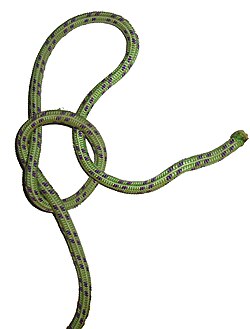(Marked this version for translation) |
m (Include categorization in the translation) |
||
| Line 9: | Line 9: | ||
| warnings = If tied as shown in the illustration, the running end (on the right) will pull through the loop if even the slightest load is applied to the standing end (on the left). If one reverses the standing end and running ends in the illustration, the knot is far more stable. As shown, the knot will hold a load on the running end, but not on the standing end. | | warnings = If tied as shown in the illustration, the running end (on the right) will pull through the loop if even the slightest load is applied to the standing end (on the left). If one reverses the standing end and running ends in the illustration, the knot is far more stable. As shown, the knot will hold a load on the running end, but not on the standing end. | ||
}} | }} | ||
| − | |||
<noinclude> | <noinclude> | ||
[[Category:Adventist Youth Honors Answer Book/Transcluded Modules|{{SUBPAGENAME}}]] | [[Category:Adventist Youth Honors Answer Book/Transcluded Modules|{{SUBPAGENAME}}]] | ||
</noinclude> | </noinclude> | ||
| + | <noinclude></translate></noinclude> | ||
Revision as of 15:42, 3 March 2016
| Slip knot |
|---|
|
Use: A slip knot is one that will tighten under load, and which can be easily untied by pulling on the running end. This knot is typically a component of more complicated knots, and is generally not used by itself.
How to tie:
WARNING: If tied as shown in the illustration, the running end (on the right) will pull through the loop if even the slightest load is applied to the standing end (on the left). If one reverses the standing end and running ends in the illustration, the knot is far more stable. As shown, the knot will hold a load on the running end, but not on the standing end.
|

